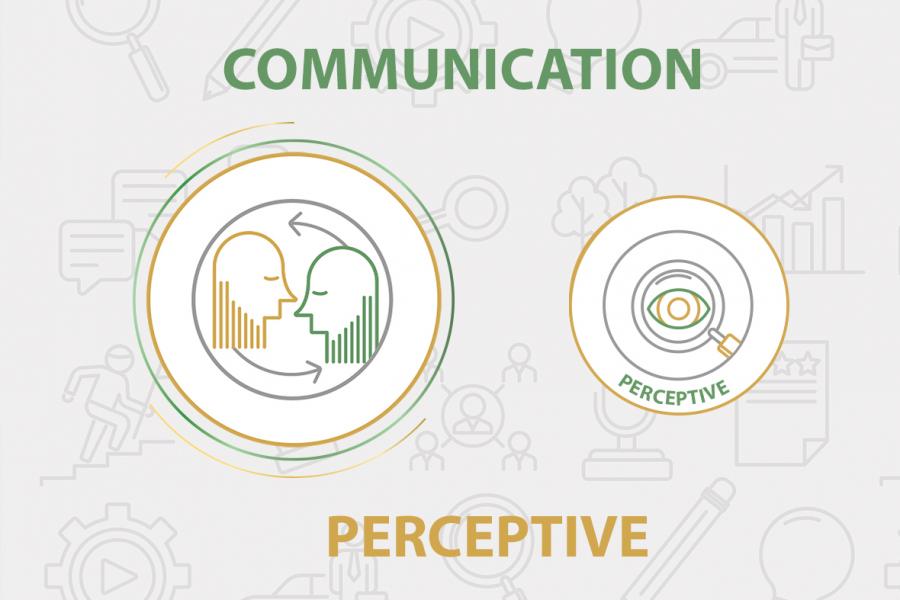 Effective Communication -Perception Skills
Effective Communication -Perception Skills
Improving skills of perception - improving insight and seeing what others cannot.
Effective Communication - Perception Skills
Case Study
Sabe Langa had a real problem and wasn’t sure what to do next. She had a lot of confidence in Arnold Chonco, but she was the only one who felt that way. Perhaps if she ran through the entire story again in her mind she would see the solution. Sabe has been the Career Development Practitioner at Umlazi Career Centre for almost twenty years. Sabe valued the importance of honesty and hard work and she now was one of the most respected managers in the company. Sabe had hired Arnold Chonco despite his history of petty theft and a short amount of time in prison in the past. Sabe understood how Arnold felt when he asked for another chance at life. Sabe decided to give him that chance. Arnold eagerly accepted a job doing maintenance work at the Career Centre. Things had gone well at first. Everyone seemed to like Arnold and he made several new friends.
Sabe had been vaguely disturbed about two months ago when another worker reported his wallet missing. She confronted Arnold about this and was reassured when Arnold understood her concern and earnestly but calmly asserted his innocence. Sabe was especially relieved when the wallet was found a few days later. The events of last week however, had caused serious trouble. First, a new personnel clerk had come across records about Arnold’s past while updating employee files. Assuming that the information was common knowledge, the clerk had mentioned to several employees what a good thing it was to give ex-convicts like Arnold a chance.
The next day someone in bookkeeping discovered some money missing from petty cash. Another worker claimed to have seen Arnold in the area around the office petty cash box, which was open during working hours, earlier that same day. Most people assumed Arnold was the thief. Even the worker whose wallet had been misplaced suggested that perhaps Arnold had indeed stolen it but returned it when questioned. Several employees had approached Sabe and requested that Arnold be fired. Meanwhile, when Sabe had discussed the problem with Arnold, Arnold had been defensive and sullen and said little about the petty cash situation other than to deny stealing the money. Should she fire Arnold? The evidence, of course, was purely circumstantial, yet everybody else seemed to see things quite clearly. They had decided that he was guilty. Sabe feared that if she did not fire Arnold, she would lose everyone’s trust and that some people might even begin to question her own motives.
- Learning
- Personality
- Motivation
- Not collecting enough information about other people.
- Basing our judgements on information that is irrelevant or insignificant.
- Seeing what we expect to see and what we want to see and not investigating further.
- Allowing early information about someone to affect our judgement, despite later and contradictory information.
- Accepting stereotypes uncritically.
- Allowing our own characteristics to affect what we see in others and how we judge them.
- Attempting to decode nonverbal behaviour outside the context in which it appears.
- Observe how your behaviour impacts others
- Ask for feedback
- Make behavioural changes where necessary
- Learning patience and avoiding instant and snap judgements about others.
- Collecting and consciously using more information about other people.
- Developing self-awareness and an understanding of how our personal biases and preferences affect our perceptions and judgements of other people.
- Learning about other cultures and keeping an open mind. Accepting that differences are a benefit.
- Do not accept that your perceptions are reality. Your perceptions are only true for you not others.
- Be respectful of others’ perceptions.
- Do not hold your perceptions too tightly, they may be wrong (admitting it takes courage).
- Recognise that there might be distortions within you that may warp your perceptions.
- Challenge your perceptions as often as you can.
- Seek counsel from experts and credible others (do not just ask your friends because they likely have the same perceptions as you).
- Be open to modifying your perceptions.
Shared under a Creative Commons Attribution-NonCommercial-NoDerivatives 2.0 South Africa (CC BY-NC-ND 2.0 ZA)
This means you can share and adapt this work but not for commercial purposes. You will only need to include the following reference to the original content in all shared works.
Kindly attribute as follows:
Beukes, C. J., Mahadave, K., & Kanhai, K. (2022). Professional Development Portfolio for Career Development Practitioners (1st ed.). CC BY-NC-SA 2.0 ZA, https://creativecommons.org/licenses/by-nc-nd/2.0/za/
Authors
![]() Karuna Mahadave
Karuna Mahadave
![]() Christopher John Beukes
Christopher John Beukes

You can earn 1.00 CPD point/s by completing and passing the self-assessment questionnaire for this article.
1.00